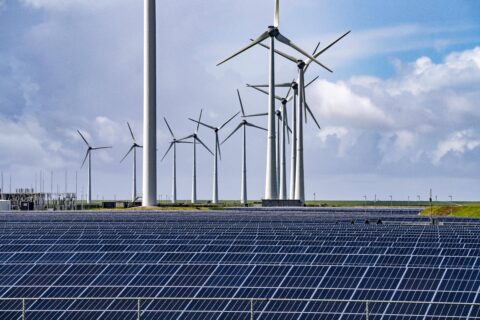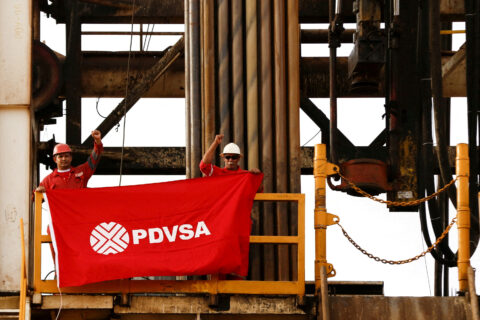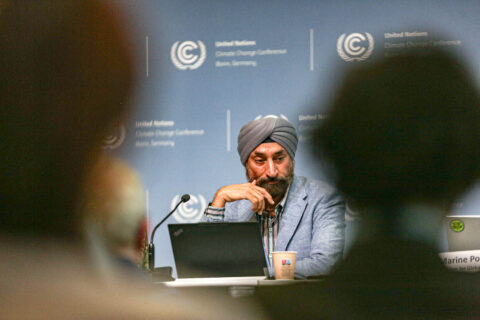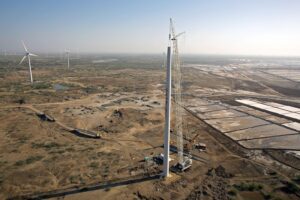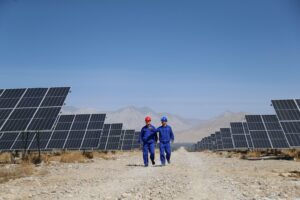Welcome to Carbon Brief’s DeBriefed.
An essential guide to the week’s key developments relating to climate change.
This is an online version of Carbon Brief’s weekly DeBriefed email newsletter. Subscribe for free here.
This week
Methane on the rise
NEAR-RECORD LEVELS: Methane emissions from the fossil-fuel industry rose to near-record levels of 120m tonnes last year, “despite technology available to curb this pollution at virtually no cost”, according to Agence France-Presse. Reuters added that the high levels of methane emissions were produced despite commitments by companies and governments to plug leaking fossil-fuel infrastructure, according to the International Energy Agency’s (IEA) annual methane tracker report.
MORE METHANE: Separately, a new study in Nature concluded that US oil-and-gas infrastructure emits three times as much methane into the atmosphere as government estimates suggest, the Associated Press reported. According to New Scientist, the study was based on nearly one million aerial surveys of methane leaks, creating what one of the scientists described as “the largest such dataset that has ever been assembled”.
Europe’s climate risks
MAJOR SHOCKS: The European Environment Agency (EEA) has issued its first assessment of the “urgent” climate risks facing Europe, the Guardian reported. More action is needed to address half of the 36 significant climate risks, such as wildfires and other climate disasters, according to the report, the Guardian said. The Financial Times noted that, according to the EEA, the EU is at “higher and higher” risk of major financial shocks from climate change.
DECIMATED FARMING: Meanwhile, Politico reported that the European Commission is working on legislative proposals that would “severely weaken” environmental requirements for agricultural workers in the EU, amid ongoing farmers’ protests across the continent. This is despite advice by top EU scientists that agriculture “must become more sustainable or it will be decimated by climate change”, the article added.
Around the world
- ZAMBIA DROUGHT: More than one million people face food shortages and malnutrition in Zambia due to crop failures triggered by drought, according to an Oxfam report covered by Down To Earth. Much of southern Africa continued to face record temperatures.
- TRANSITIONING AWAY?: The US Export-Import Bank, a federal institution that finances projects overseas, has voted to put $500m toward an oil-and-gas project in Bahrain, according to the New York Times. It noted that this was viewed by critics as “out of step” with US pledges to move away from fossil fuels.
- SHELL BACKTRACKS: Oil giant Shell has weakened its emissions target for 2030 and dropped its goal for 2035 entirely, in an update to its “energy transition strategy”, Bloomberg reported. Carbon Brief explained the changes with charts.
- YOUTH AT RISK: Young activists, including climate campaigners, must be better protected from online attacks, arrests and physical threats, according to a report by UN special rapporteur on human rights defenders Mary Lawlor, covered by the Guardian.
- GAS BOOST: UK energy secretary Claire Coutinho announced plans to support new gas power plants, claiming that without them the country could face “blackouts”, the Press Association reported. Ministers later confirmed that unabated gas would still only meet around 1% of demand in 2035.
- ELECTRIC SWAP: Mexico’s parliament has agreed to amend the nation’s General Law on Climate Change to support programmes that facilitate the replacement of combustion-engine cars with electric and hybrid vehicles, according to Excélsior.
$1 trillion
The amount that India has asked developed countries to provide in climate finance each year from 2025 as a minimum to help developing countries deal with climate change, according to the Times of India.
Latest climate research
- New research in Nature estimated that global economic losses from heat stress could reach 0.6-4.6% by 2060. Major losses came from health impacts, lower labour productivity and disruptions to supply chains, the study found.
- Fears about Covid-19 reinforced climate change concerns rather than providing a distraction from the crisis, according to a new survey of 28 European countries published in Climate Risk Management.
- Newcastle University in the UK is asking members of the public to participate in a survey into “uncertainty distress” in relation to climate change.
Captured

New Carbon Brief analysis based on provisional government data showed that UK emissions fell to just 383m tonnes of carbon dioxide equivalent (MtCO2e) in 2023. This marked the first time emissions have fallen below 400MtCO2e since Victorian times. However, this drop was mostly unrelated to deliberate climate action by the government. Instead, much of it came about due to a drop in gas demand, driven by factors such as higher electricity imports from French nuclear plants and warmer temperatures. The analysis was covered by the Times and was the focus of an editorial.
Spotlight
‘Drill, baby, drill’: The history of Trump’s favourite slogan
Carbon Brief explores the history of a slogan claimed by Donald Trump, but with roots stretching back to Sarah Palin and, prior to this, the Black Panthers.
The senior Republican who first used the phrase tells Carbon Brief that he is critical of Trump and those who want to “drill with abandon” today.
In a recent interview with Fox News, former president Donald Trump summarised his plans for US fossil-fuel production if he wins the election this year, by saying:
“We are going to – I used this expression, now everyone else is using it so I hate to use it, but – drill, baby, drill.”
Despite Trump’s assertion, it was Michael Steele, the US politician who was the first African-American lieutenant governor of Maryland and chair of the Republican National Committee, who came up with the slogan
Addressing the 2008 Republican National Convention, he told the crowd:
“Let’s reduce our dependency on foreign sources of oil, and promote oil-and-gas production at home. Let me make it very clear: Drill, baby, drill, and drill now.”
Speaking to Carbon Brief, Steele said that the slogan came to him late at night, after a fit of “writer’s block”.
“Donald Trump…his BS aside, had nothing to do with ‘drill, baby drill’,” stressed Steele, who today is a staunch critic of the Republican presidential candidate.
The phrase was used by supporters throughout the campaign of Republican John McCain in his unsuccessful presidential bid against Barack Obama.
It became particularly associated with Sarah Palin, the climate-sceptic Republican vice-presidential pick, who said in a debate with her Democratic challenger Joe Biden:
“The chant is ‘drill, baby, drill’. And that’s what we hear all across this country in our rallies because people are so hungry for those domestic sources of energy.”
In the years that followed, the phrase was repeated endlessly by Republican politicians, as well as in comment articles and political analysis. (It did, however, see a dip in popularity following the Deepwater Horizon oil spill in 2010.)
There was some bemusement at a slogan that appeared to have been derived from “burn, baby, burn”.
That phrase, which has since made its way into everything from disco songs to hot sauce, was originally associated with Black nationalist group the Black Panthers and particularly the 1965 Watts riots in Los Angeles. It was chanted as buildings were set on fire, amid civil unrest sparked by police violence against an African-American man.
Writing shortly after the Republican National Convention in 2008, journalist Derrick Z Jackson alluded to this when he wrote in the Boston Globe:
“This 93% White gathering blithely stole from the race riots of the ’60s to lustily chant ‘drill, baby, drill’.”
For his part, Steele told Carbon Brief that his intention was to use a colloquial expression to “connect it to something that was very real” – namely, cutting US reliance on Middle Eastern oil. He said:
“Unfortunately, a lot of people use it…in a way that they don’t fully appreciate what the point was, and the point was the self-sufficiency of the American spirit.”
He added that “it’s not just ‘drill with abandon’, it’s also the idea of drilling responsibly”, noting that, with the growth of electric cars and other technologies in the US:
“‘Drill, baby, drill’ may at some point in the future change to…‘plug, baby, plug’.”
Nevertheless, Steele accepted that while he will “always be there to remind [Trump]” of where the slogan came from, it is out of his hands now:
“My only regret is that I didn’t copyright it and put it on a T-shirt.”
Watch, read, listen
‘OIL COLONIALISM’: The latest episode of the Drilled podcast explored how Nigerians are “resisting oil colonialism” after Shell announced at the end of 2023 that it was shutting down its onshore operations in the country.
CLIMATE PLOTTERS: An article in Sierra examined what it called a “conspiracy to take down wind and solar power” across the US, made up of “climate-science deniers, right-wing think tanks and fossil fuel shills”.
KYOTO ON STAGE: The Royal Shakespeare Company in Stratford-upon-Avon, UK, is putting on a production of Kyoto, a play that dramatises the UN climate summit in 1997 that gave rise to the Kyoto Protocol.
Coming up
- 15-17 March: Russian presidential election
- 18-21 March: Global Methane Forum, Geneva, Switzerland
- 21-22 March: Copenhagen Climate Ministerial, Denmark
Pick of the jobs
- International Centre for Integrated Mountain Development, senior cryosphere specialist | Salary: $66,510. Location: Kathmandu, Nepal
- UK Department for Energy Security and Net Zero, climate science advisor | Salary: £31,120-37,260. Location: Aberdeen, Birmingham, Cardiff, Darlington, Edinburgh, London or Salford, UK
- Rewiring America, writer and editor (newsletters, website) | Salary: $75,000-100,000, Location: Remote
DeBriefed is edited by Daisy Dunne. Please send any tips or feedback to debriefed@carbonbrief.org
The post DeBriefed: Global methane surge; Europe faces ‘urgent’ climate risks; Surprising origin of Trump’s ‘drill, baby, drill’ appeared first on Carbon Brief.
Climate Change
Saudi Arabia issues last-minute climate plan with unclear emissions-cutting goal
On the last day of 2025, the Saudi Arabian government submitted an updated climate plan to the United Nations which contains a new but ambiguous emissions-reduction target and argues the world should keep buying the kingdom’s fossil fuels so that it can afford to shift its economy away from oil.
The 27-page nationally determined contribution (NDC) was sent to the UN’s climate arm (UNFCCC) on December 31 2025, just in time to meet the 2015 Paris Agreement’s requirement that governments submit an NDC every five years. The bottom of the front page says in capital letters “2025 SUBMISSION TO UNFCCC”.
The document was not uploaded to the UNFCCC website, and so was not publicly available, until the night of January 5-6.
Saudi Arabia’s third climate plan sets a new target for reducing emissions by 2040 – unlike most other new NDCs which contain a goal for 2035.
As with the oil-rich government’s earlier 2030 target, it is not clear what share of the oil producing-country’s emissions the 2040 goal equates to, as the baseline is not clearly specified. The Saudi government also states that it may change the baseline, effectively making the target less ambitious if it feels unfairly targeted by global climate policies.
The document says Saudi Arabia will aim to “reduce, avoid, and remove greenhouse gas (GHG) emissions by 335 million tons of [carbon dioxide equivalent] annually reached by 2040… on the basis of a dynamic baseline, with the year 2019 designated as the base year for this NDC”.
Saudi Arabia’s last NDC in 2021 had a similar format, aiming to cut emissions by 278 million tons a year (mtpa) by 2030. But neither target specifies the total the emissions reductions should be measured against, leaving analysts unclear as to what level of absolute emissions Saudi Arabia is aiming for in 2030 and 2040.
Climate Action Tracker (CAT), which analyses climate plans from major-emitting nations, has yet to publish its view on Saudi Arabia’s new NDC.
But commenting on the 2021 NDC, it said that “although not explicitly mentioned in the document, the CAT interprets the NDC target to be a reduction below a baseline scenario. It is important to note that neither the previous nor the updated NDC includes a baseline projection to which the emissions reductions target is applied.”
A 2024 study by researchers from the Riyadh-based King Abdullah Petroleum Studies and Research Centre (KAPSARC) and the US’s Pacific Northwest National Laboratory said “the Kingdom has not officially defined the baseline emissions in their updated NDCs”. They suggested that, under Saudi Arabia’s current policies, emissions will continue to rise until at least 2060.
Saudi authorities have not clarified what baseline the previous NDC’s targets are against and have not spoken publicly about the new NDC. The website for the government’s Vision 2030 initiative says only that the Kingdom aims to “reduce carbon emissions by 278 mtpa by 2030”.
NDC depends on continued oil exports
As well as being unclear in terms of numbers, Saudi Arabia says the baseline for its 2040 target is contingent on “sustained economic growth and diversification, supported by a robust contribution from hydrocarbon export revenues to the national economy”.
Hydrocarbons are another word for fossil fuels, which the NDC says Saudi Arabia aims to become less reliant on by moving into sectors like financial and medical services, tourism, renewable energy and energy-efficiency technologies.
UN carbon accounting rules mean emissions of fossil fuels are counted where they are consumed, not where they are produced, so the emissions from exported Saudi oil do not count towards the kingdom’s emissions.
Saudi Arabia’s emissions-cutting ambitions also rest, the NDC says, “on the assumption that the economic and social consequences of international climate change policies and measures will not pose a disproportionate or abnormal burden on the Kingdom’s economy”.
The country – which gets about three-fifths of its export earnings from fossil fuels – has long been the leading opponent of international measures to reduce their production and use. It has recently opposed efforts to map out a transition away from fossil fuels in climate talks, measures to restrict plastics production in negotiations on a global treaty to cut plastic pollution and taxes on polluting ships at the International Maritime Organization.
If other governments do not continue to buy its fossil fuels in sufficient quantities, the NDC says that Saudi Arabia will use fossil fuels domestically to produce plastics and power heavy industries like cement, mining and metals production. In this scenario, Saudi Arabia’s emissions will be higher, the plan says.
The NDC lists green initiatives Saudi Arabia is pursuing, including carbon capture and storage, green hydrogen, direct air capture of greenhouse gases and renewables. To adapt to more extreme heatwaves and droughts, the NDC says the government is using cloud seeding technology to make rain artificially.
The country’s 2021 NDC set a target for Saudi Arabia to get half of its energy from renewables by 2030. That target is not mentioned in the new NDC. The International Energy Agency’s latest figures said that in 2023 the country still got far less than 1% of its energy from renewables.
Around 70 countries have yet to submit their latest NDCs, which were due in 2025, including India.
The post Saudi Arabia issues last-minute climate plan with unclear emissions-cutting goal appeared first on Climate Home News.
Saudi Arabia issues last-minute climate plan with unclear emissions-cutting goal
Climate Change
Analysis: World’s biggest historic polluter – the US – is pulling out of UN climate treaty
The US, which has announced plans to withdraw from the global climate treaty – the UN Framework Convention on Climate Change (UNFCCC) – is more historically responsible for climate change than any other country or group.
Carbon Brief analysis shows that the US has emitted a total of 542bn tonnes of carbon dioxide (GtCO2) since 1850, by burning fossil fuels, cutting down trees and other activities.
This is the largest contribution to the Earth’s warming climate by far, as shown in the figure below, with China’s 336GtCO2 significantly behind in second and Russia in third at 185GtCO2.

The US is responsible for more than a fifth of the 2,651GtCO2 that humans have pumped into the atmosphere between 1850 and 2025 as a result of fossil fuels, cement and land-use change.
China is responsible for another 13%, with the 27 nations of the EU making up another 12%.
In total, these cumulative emissions have used up more than 95% of the carbon budget for limiting global warming to 1.5C and are the predominant reason the Earth is already nearly 1.5C hotter than in pre-industrial times.
The US share of global warming is even more disproportionate when considering that its population of around 350 million people makes up just 4% of the global total.
On the basis of current populations, the US’s per-capita cumulative historical emissions are around 7 times higher than those for China, more than double the EU’s and 25 times those for India.
The US’s historical emissions of 542GtCO2 are larger than the combined total of the 133 countries with the lowest cumulative contributions, a list that includes Saudi Arabia, Spain and Nigeria. Collectively, these 133 countries have a population of more than 3 billion people.
See Carbon Brief’s previous detailed analysis of historical responsibility for climate change for more details on the data sources and methodology, as well as consumption-based emissions.
Additionally, in 2023, Carbon Brief published an article that looked at the “radical” impact of reassigning responsibility for historical emissions to colonial rulers in the past.
This approach has a very limited impact on the US, which became independent before the vast majority of its historical emissions had taken place.
The post Analysis: World’s biggest historic polluter – the US – is pulling out of UN climate treaty appeared first on Carbon Brief.
Analysis: World’s biggest historic polluter – the US – is pulling out of UN climate treaty
Climate Change
Trump to pull US out of UN climate convention and climate science body
Under the Trump administration, the US – the world’s second-largest carbon polluter – will become the first country to withdraw from the UN climate convention, a key bedrock for international climate diplomacy, in a move that will cut it off from global decision-making on climate change.
On January 7, the White House issued a presidential memorandum announcing that the US will quit 31 UN bodies, among them the UN Framework Convention on Climate Change (UNFCCC). It will also leave 35 other international organisations – many of them environmental – including the Intergovernmental Panel on Climate Change (IPCC), the most authoritative global voice on climate science.
While the Trump administration already gave notice nearly a year ago that the US would quit the Paris Agreement, under which countries agreed to limit global warming to “well below” 2 degrees Celsius, it did not at that time attempt to leave the UNFCCC. The climate convention, adopted in 1992, is the bedrock of the world’s efforts to curb climate change and tackle its impacts.
The US has already ceased all funding to the UNFCCC, and would be the only nation to formally exit the convention. After officially notifying the UN of its decision, the withdrawal will take effect after a period of one year.
The country has also decided to exit key organisations for nature conservation, including the International Union for the Conservation of Nature (IUCN), which publishes a “red list” of endangered species, and the Intergovernmental Science-Policy Platform on Biodiversity and Ecosystem Services (IPBES), the scientific advisory body to the UN biodiversity convention.
In addition, the US will leave the International Renewable Energy Agency (IRENA) and the International Solar Alliance (ISA), both of which promote the use of renewable energy.
In a statement, US Secretary of State Marco Rubio said “we will stop subsidizing globalist bureaucrats who act against our interests”, adding that US membership of other international organisations remains under review.
“The Trump Administration has found these institutions to be redundant in their scope, mismanaged, unnecessary, wasteful, poorly run, captured by the interests of actors advancing their own agendas contrary to our own, or a threat to our nation’s sovereignty, freedoms, and general prosperity,” Rubio said.
Rejoining possible
The US Senate ratified the UNFCCC in 1992, which experts said raises questions about the legality of Trump’s move to exit through an executive order.
But legal scholars have indicated that the Senate would not need to ratify the UN climate convention again if the country wishes to rejoin.
In a blog, Jake Schmidt, senior strategic director for international climate at the Natural Resources Defense Council (NRDC) wrote that, based on the Senate’s original “advice and consent”, the US could once again become a party to the UNFCCC 90 days after such a decision were formalised.
Indian law enforcement targets climate activists accused of opposing fossil fuels
Sue Biniaz, the US State Department’s former principal deputy special envoy for climate until January 2025, said she hoped the federal retreat would be “a temporary one”.
“There are multiple future pathways to rejoining the key climate agreements,” she added, saying she agreed with treaty scholars who consider the US “could rather seamlessly rejoin” the UNFCCC based on the Senate’s 1992 approval.
Forfeiting influence
Experts criticised the move, saying it would isolate the US from global policy-making on climate change and disadvantage Americans in adapting to its worsening effects. But many expressed optimism that the rest of the world would continue to push forward with efforts to curb planet-warming emissions.
The NRDC’s Schmidt noted, however, that the US absence would “complicate the climate negotiations, as a major economy pulling in the wrong direction always makes forging global progress more difficult”.
Former US climate envoy John Kerry said Trump’s decision is “a gift to China and a get-out-of-jail-free card to countries and polluters who want to avoid responsibility”. He added that “the price is always paid by kids, in lost health, squandered jobs, rising costs, uninsurable infrastructure, and worse consequences.”
Gina McCarthy, a former Environmental Protection Agency (EPA) administrator and the first White House National Climate Advisor under Joe Biden, said the move to quit the UNFCCC is “a shortsighted, embarrassing, and foolish decision”, as the country will forfeit influence over “trillions of dollars in investments, policies, and decisions that would have advanced our economy and protected us from costly disasters wreaking havoc on our country”.
McCarthy, who now chairs “America Is All In”, a coalition of US cities, states and businesses and institutions working on climate action, said her organisation is committed to collaborating with international partners “to lower energy costs, cut pollution, and deliver on the goals of the Paris Agreement”.
Comment: COP presidencies should focus less on climate policy, more on global politics
David Widawsky, director of the World Resources Institute US, described the US withdrawal from the UN climate convention as a “strategic blunder that gives away American advantage for nothing in return”. But, he added, global climate diplomacy “will not falter” since other countries “understand the UNFCCC’s irreplaceable role” in advancing climate solutions and driving cooperation.
On the decision to quit the IPCC, Delta Merner, associate accountability campaign director for the Climate and Energy Program at the Union of Concerned Scientists, said President Trump is “deliberately cutting our nation’s formal participation off from the world’s most trusted source of climate science”.
While individual US scientists can still contribute, the country will “no longer be able to help guide the scientific assessments that governments around the world rely on”, she added in a statement.
The post Trump to pull US out of UN climate convention and climate science body appeared first on Climate Home News.
Trump to pull US out of UN climate convention and climate science body
-
Greenhouse Gases5 months ago
Guest post: Why China is still building new coal – and when it might stop
-
Climate Change5 months ago
Guest post: Why China is still building new coal – and when it might stop
-
Climate Change2 years ago
Spanish-language misinformation on renewable energy spreads online, report shows
-

 Greenhouse Gases2 years ago
Greenhouse Gases2 years ago嘉宾来稿:满足中国增长的用电需求 光伏加储能“比新建煤电更实惠”
-
Climate Change Videos2 years ago
The toxic gas flares fuelling Nigeria’s climate change – BBC News
-

 Climate Change2 years ago
Climate Change2 years ago嘉宾来稿:满足中国增长的用电需求 光伏加储能“比新建煤电更实惠”
-

 Carbon Footprint2 years ago
Carbon Footprint2 years agoUS SEC’s Climate Disclosure Rules Spur Renewed Interest in Carbon Credits
-
Climate Change2 years ago
Bill Discounting Climate Change in Florida’s Energy Policy Awaits DeSantis’ Approval



